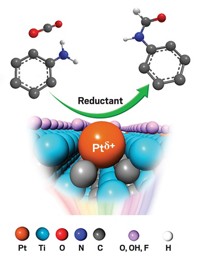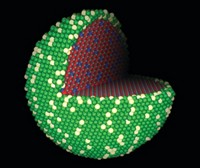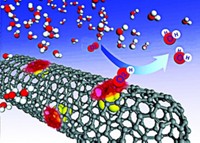Advertisement
Grab your lab coat. Let's get started
Welcome!
Welcome!
Create an account below to get 6 C&EN articles per month, receive newsletters and more - all free.
It seems this is your first time logging in online. Please enter the following information to continue.
As an ACS member you automatically get access to this site. All we need is few more details to create your reading experience.
Not you? Sign in with a different account.
Not you? Sign in with a different account.
ERROR 1
ERROR 1
ERROR 2
ERROR 2
ERROR 2
ERROR 2
ERROR 2
Password and Confirm password must match.
If you have an ACS member number, please enter it here so we can link this account to your membership. (optional)
ERROR 2
ACS values your privacy. By submitting your information, you are gaining access to C&EN and subscribing to our weekly newsletter. We use the information you provide to make your reading experience better, and we will never sell your data to third party members.
Energy
Metal Nitride Support Boosts Fuel-Cell Catalyst Performance
Substituting mixed-metal nitrides for carbon supports typically used for fuel-cell catalysts improves device performance and durability
by Mitch Jacoby
June 2, 2014
| A version of this story appeared in
Volume 92, Issue 22
Fuel cells have been used for decades to supply electricity for space and terrestrial applications. Yet these electrochemical devices, which have been eyed for automotive use, have not been broadly commercialized in part because of durability problems and high cost. In particular, normal fuel-cell operation corrodes and oxidizes the carbon materials typically used as catalyst supports, leading to catalyst degradation and poor device performance. Metal nitrides have been studied as replacement supports, but they don’t always tolerate the acidic conditions required for some fuels. A Cornell University team led by Francis J. DiSalvo now reports that a titanium chromium nitride material appears to overcome those problems (ACS Nano 2014, DOI: 10.1021/nn5014337). The researchers found that palladium-silver nanoparticles supported on a highly porous Ti0.5Cr0.5N network serves as an active and stable catalyst system in acidic and alkaline media across the typical range of fuel-cell voltages. Tests using methanol and formic acid solutions—alkaline and acidic, respectively—show that the PdAg/Ti0.5Cr0.5N system remains more active and durable than the same catalyst or a palladium nanoparticle catalyst supported on standard carbon materials.





Join the conversation
Contact the reporter
Submit a Letter to the Editor for publication
Engage with us on Twitter